10 Best Big Cartel Alternatives & Competitors (2024 Comparison)
Looking for the best Big Cartel alternatives? You’re in the right place.
Big Cartel is one of the most popular and affordable ecommerce builders for small businesses and entrepreneurs, but it definitely falls short in a few areas.
But fear not—there are lots of great ecommerce platforms like Big Cartel out there that you might want to use instead. And we’ve listed our favorites right here.
In this in-depth comparison of the best Big Cartel alternatives, we’ll be telling you everything you need to know about each platform including their strengths, weaknesses, features, pricing, and beyond.
The best Big Cartel alternatives – summary
TL;DR:
Sellfy is the best Big Cartel alternative for most artists and makers. It’s easy to use and has all the features you’ll need to start selling online.
You can even sell print-on-demand merch without needing to subscribe to third-party providers. And there are no transaction fees!
For those wanting additional ecommerce functionality, consider Shopify for building your online store. It’s best suited to larger ecommerce stores. The downside is that you will be subject to transaction fees.
#1 – Sellfy
Sellfy is our overall favorite Big Cartel alternative. It’s a full-featured ecommerce store and print on demand site rolled into one. Like Big Cartel, it’s marketed at creators. But it has some advanced features that Big Cartel lacks.
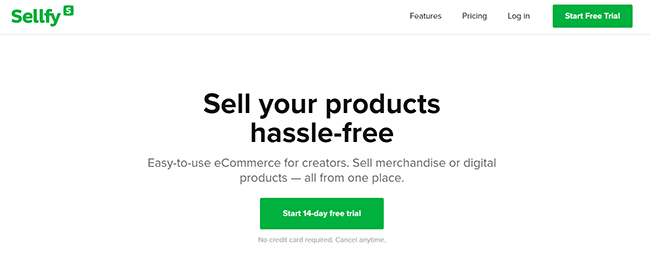
You can use Sellfy to sell pretty much anything you can think of. It supports all types of digital products, including ebooks, audio, PSD files, AI files, music, etc.
But on top of that, you can also sell physical, tangible items through your Sellfy storefront with inventory management, product variants, and shipping tools.
And you don’t even have to hold the stock you sell thanks to Sellfy’s innovative print-on-demand feature—something few other platforms offer.
You can upload designs and add them to products in Sellfy’s print-on-demand catalog, then import those products to your store and sell them at your chosen retail price. When you make a sale, Sellfy prints the product and ships it to the customer for you, then bills you for their cut.
This makes Sellfy ideal for influencers and creators with a social following who want to sell their own branded merch. It’s also perfect for artists who want to sell products featuring their original designs.
And it doesn’t end there. In addition to physical products, digital downloads, and subscriptions, Sellfy also has the tools you need to create and sell digital subscription products for recurring payments—and video-on-demand products.
Once you sign up for the platform, you can create your own beautiful store in as little as 5 minutes and customize it to match your brand. Then, add your products and let customers purchase them with the built-in shopping cart and streamlined checkout.
It’s also jam-packed with features to help you sell more products, including upselling, discount code generation, email marketing tools, tracking pixels, embeddable buttons, and more.
Key features
- Sell all types of products
- Print-on-demand feature
- Store builder
- Themes
- Emails
- Upsells
- SSL
- Payment gateway integrations
- VAT & tax setting
- Coupons
Pros and cons
| Pros | Cons |
| Easy to use | Annual sales are capped at $10k – $200k depending on your plan |
| Great for creators | Paid plans are a bit more expensive than Big Cartel |
| Built-in print on demand fulfillment | |
| Unlimited products on paid plans |
Pricing
Sellfy plans start at $22/month with no transaction fees. Just bear in mind that different plans come with different annual sales limits, so make sure to choose one that’s right for your business.
Read our Sellfy review.
#2 – Payhip
Payhip is a simple but powerful ecommerce platform. Its affordable pricing plans and beginner-friendly interface make it a good alternative for Big Cartel’s target audience of artists and makers.
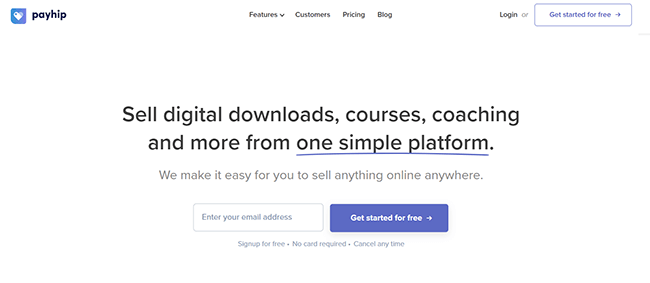
Payhip has everything you’re looking for in an ecommerce platform. There’s a fully-customizable store builder that couldn’t be easier to use—you can set up your store in minutes without any coding knowledge.
Plus, payment gateway integrations, inventory management tools, digital product delivery, email marketing, a basic online course builder, and more.
And if you already have a website that you want to start selling through, you can just embed Payhip’s high-converting checkout on it in a couple of clicks.
But what makes Payhip great is its simplicity.
The interface is very easy to work with, the pricing model couldn’t be simpler, and you get a bunch of time-saving features that simplify running your business. For example, Payhip reports and pays digital EU and UK VAT for you to make tax compliance easy.
All of the above make it the perfect choice for first-time sellers and solopreneurs.
And the best part is that no matter which Payhip plan you sign up for, you get access to everything: all features, unlimited products, and unlimited revenue. The only difference between plans is the transaction fees you’ll be subject to.
Key features
- Digital products
- Online courses & coaching
- Subscriptions & memberships
- Inventory management
- Marketing tools
- VAT & tax
- Store builder
- Payment system
- Email marketing
Pros and cons
| Pros | Cons |
| Good user interface | Support could be better |
| Broad feature set | Transaction fees on Free and Plus plan |
| All features & unlimited usage on all plans | |
| Great value |
Pricing
Payhip offers three plans: Free, Plus ($29/month), and Pro ($99/month). Only the Pro plan has zero transaction fees.
Read our Payhip review.
#3 – Shopify
Shopify is one of the most popular and widely used ecommerce platforms in the world—and for good reason. It’s a little pricier than Big Cartel, but its performance, versatility, and feature set are second to none.
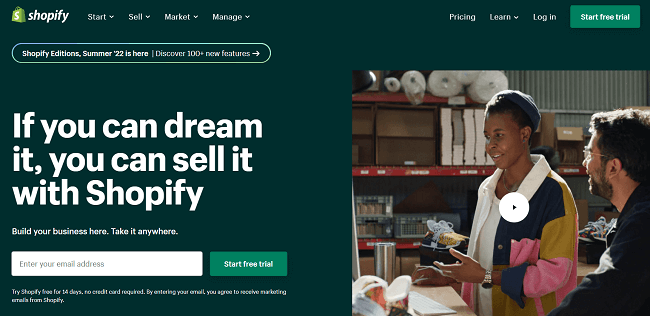
Shopify is much more popular than Big Cartel, with millions of users all across the world. There are a few reasons for that popularity, but one of the main ones is Shopify’s versatility.
Unlike Big Cartel, which is mostly only suitable for smaller stores and independent entrepreneurs, Shopify can power any type of business, from the smallest stores to huge enterprises with 7-figure turnovers.
The reason it’s so versatile is in part thanks to its App Store.
Shopify comes with all the core ecommerce features that most retailers need out of the box, like a store builder, powerful product ordering and inventory management tools, customizable store themes, a best-in-class checkout, and so on.
But you can extend its functionality as needed by installing extensions through the Shopify App Store. There are thousands of free and paid add-ons available, from dropshipping extensions to product review extensions and everything in between.
As far as performance goes, Shopify can’t be beaten. Stores load super fast and the included web hosting is very reliable. Shopify also takes care of all the technical stuff for you like site security and maintenance, so you can focus on running your business.
The downside is monthly subscription fees are a lot higher than Big Cartel. And you’ll be subject to additional transaction fees unless you use Shopify Payments (Shopify’s in-house payment gateway).
Key features
- Order management
- Inventory management
- Store builder
- Free and paid themes
- App Store
- Hosting
- Marketing tools
- Checkout
Pros and cons
| Pros | Cons |
| Versatile | More expensive than Big Cartel |
| Huge app store | Transaction fees if using a third-party payment gateway |
| Fast and reliable | |
| Nice UI |
Pricing
Plans start from $39/month. Yearly discounts available. Get started with a 3-day free trial, then $1/month after for 3 months.
#4 – BigCommerce
BigCommerce is another very popular ecommerce builder that’s worth checking out. Again, it’s a little more expensive than Big Cartel, but you get what you pay for.
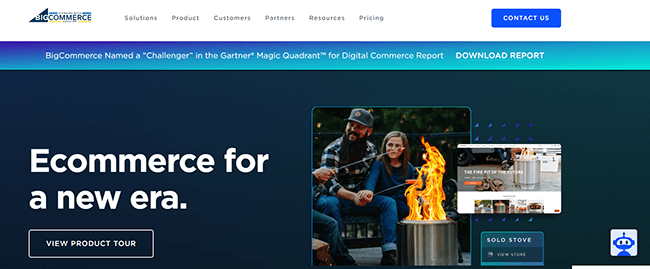
BigCommerce has two main product offerings: BigCommerce Enterprise and BigCommerce Essentials.
Unless you’re running a large business with a very high turnover and complex operations, you’ll probably want to go with one of the Essentials plans.
Regardless of which plan you sign up for, you get all the core ecommerce features: unlimited products and bandwidth, an online storefront, sales channel integration, a single-page checkout, payment gateway integrations, coupon and discount engine, reporting tools, etc.
But the more expensive plans have additional features that can help boost your sales like abandoned cart saver emails, automatically-saved shopping carts, custom product filtering, and more.
BigCommerce has a lot of features that you don’t get on Big Cartel, including product ratings/reviews and native blogging functionality. You can use the built-in blog to drive traffic to your BigCommerce store. To do the same on Big Cartel, you’d have to use a third-party platform.
Key features
- Page builder
- One-page checkout
- Shopping cart recovery
- Inventory management
- Customer groups
- Product reviews and ratings
- Shipping tools
- Built-in blog
- POS integrations
- Sales channel integrations
- SEO
Pros and cons
| Pros | Cons |
| More advanced feature set | More expensive |
| Great support | Takes longer to set up |
| Blogging & SEO tools | |
| Scalable and flexible |
Pricing
Plans start at $39/month. A 15-day free trial is available. Save 25% with a yearly subscription.
#5 – Podia
Podia is a digital ecommerce platform and a great alternative to Big Cartel if you only plan on selling digital goods.

Unfortunately, you can’t really sell physical products on Podia as it doesn’t have the shipping, fulfillment, or inventory management tools you’d need to manage your operations.
However, it’s tough to beat Podia when it comes to selling digital products.
It has a bunch of innovative features that you don’t get with its competitors. Namely, a powerful Communities tool and built-in learning management system (LMS).
The Communities tool lets you set up a virtual members-only community space for your subscribers in one click. And the LMS allows you to create lessons, organize them into full-fledged courses, and start enrolling students.
The above feature makes Podia perfect for selling online courses and paid community memberships. But of course, you can also sell regular digital downloads too. If you want to, you can even bundle different products together in subscription packages.
Key features
- Site builder
- Payments
- Checkout
- Webinar hosting
- Email and affiliate marketing
- Communities
- Course builder
- Integrations
Pros and cons
| Pros | Cons |
| Great Communities tool | Doesn’t support physical products |
| Powerful LMS | Free plan subject to hefty transaction fees |
| Ease of use | |
| All-in-one platform |
Pricing
Podia has a free plan with 8% transaction fees. Paid plans with no fees start from $33/month billed annually
Read our Podia review.
#6 – WooCommerce (WordPress only)
WooCommerce is an ecommerce plugin for WordPress. It’s a great option if you have a preexisting WordPress site that you’d like to use to start making sales.

It’s a super flexible plugin that runs alongside WordPress. As it’s open-source, you can customize it in just about any way you like. This gives you total control over the way you run your store, and which tools and add-ons you use.
Another perk of WooCommerce is that it’s completely free to use both WordPress and the WooCommerce plugin. All you have to pay for is your hosting package.
If you’re well-versed in website management then this might be a big perk. However, it’s a little more hassle than having hosting and website management in one place, as you do with Big Cartel.
WooCommerce comes preloaded with most of the common ecommerce functions you need such as payments and checkout software, and order management features. On top of that, there are also tons of free and paid extensions that you can use to get the exact features you need.
Overall, it’s a great choice for anyone that likes freedom when it comes to design and store customization.
Key features
- Payments and checkout features
- Shipping management
- Mobile app
- Email marketing
- Tons of extensions available
Pros and cons
| Pros | Cons |
| Open-source and free (hosting package required) | Hosting not included |
| Highly flexible and customizable | Not as intuitive as some all-in-one solutions |
| Extensions and Addons |
Pricing
WooCommerce is a free plugin but there are some paid extensions available. You’ll also need to pay for web hosting. We’d recommend using dedicated WooCommerce hosting with Liquid Web.
#7 – Weebly
Weebly is best known as a general-purpose website builder but it also comes with some ecommerce features you can use to build an online store.
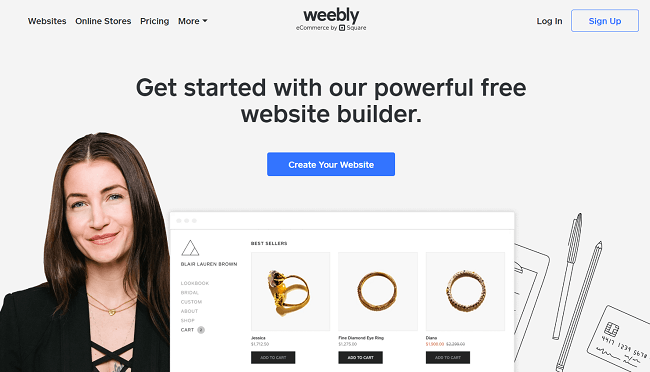
Our favorite thing about Weebly is the price. It’s not as sophisticated as some other ecommerce platforms but it offers superb value for money, with comparable prices and a similar feature set to Big Cartel.
You can use Weebly to create a unique online store in no time. Start with a professionally-designed theme and customize it with the drag-and-drop builder to showcase your products in their best light.
You also get a bunch of smart marketing tools, including customizable email marketing templates, SEO optimization, analytics, and more.
And to help you manage your day-to-day operations, there’s built-in inventory tracking and a straightforward shipping tool.
The Weebly checkout is powered by Square but you can also use Stripe or PayPal.
Key features
- Store builder
- Customizable themes
- Emails
- SEO
- Analytics
- Customer reviews
- Product search
- Sales badges
- Coupons
- Mobile app
- Gift cards
- Inventory tracking
- Shipping tool
- Automatic tax calculator
- Shopping cart
Pros and cons
| Pros | Cons |
| Very affordable | Few payment gateway options |
| Excellent value for money | Lacks some advanced features |
| Beginner friendly | |
| Good templates |
Pricing
Plans start at 10 €/month when paid annually
#8 – Shift4Shop
Shift4Shop is a great Big Cartel alternative that offers tons of premium ecommerce features completely free.

Shift4Shop offers an advanced website builder that requires no coding skills, as well as a range of themes optimized for ecommerce stores. You can run any sort of ecommerce venture using Shift4Shop from dropshipping to subscription sites and more.
As well as website building, Shift4Shop can also be used to manage orders and products, market your business and host your site. It also has features that help you optimize your store for mobile ecommerce.
Although Shift4Shop is a free-to-use platform, you’ll need to use the Shift4 payment terminal to take your payments, so this is worth noting if you were planning on using a different payment solution.
Overall, it’s a really great platform that has everything you need to start an online business.
Key features
- Advanced website builder
- Ecommerce themes
- Order management
- Product management
- Mobile ecommerce
Pros and cons
| Pros | Cons |
| Free to use | Shift4 payment gateway is mandatory |
| Good website builder |
Pricing
Shift4Shop is free forever as long as you use the Shift4 payment gateway.
#9 – Squarespace
Squarespace is an all-in-one website-building tool with a heavy focus on eCommerce functionality. The platform boasts an extremely easy-to-use, drag-and-drop site builder, and a wide selection of highly optimized ecommerce templates.
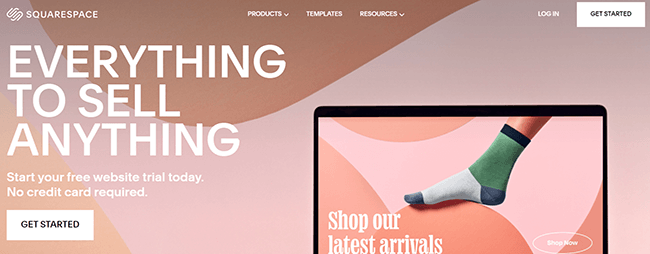
You can use Squarespace to sell products or services, and it also has booking and calendar functions that can help you manage service businesses. It’s a really versatile option, as there are features for selling subscriptions and even promoting and selling digital products like music.
Squarespace can also be used to manage essential ecommerce tasks such as shipping and fulfillment, taxes, and payments. You can manage these tasks in a simple unified dashboard.
Squarespace is extremely easy-to-use making it a great choice for beginners.
Key features
- Drag and drop website builder
- Ecommerce templates
- Payment management
- Shipping and fulfillment management
- Sell physical or digital products
Pros and cons
| Pros | Cons |
| Easy to use | Limited customization and flexibility |
| Tons of optimized ecommerce templates |
Pricing
Plans start from as little as $12/month. However, the cheapest ecommerce plans start from $26/month.
#10 – Wix
Wix is a website-building tool and ecommerce platform that can be used to build highly optimized online stores. The best thing about Wix is that it’s an all-in-one tool. You can use it to build, manage and host your website.
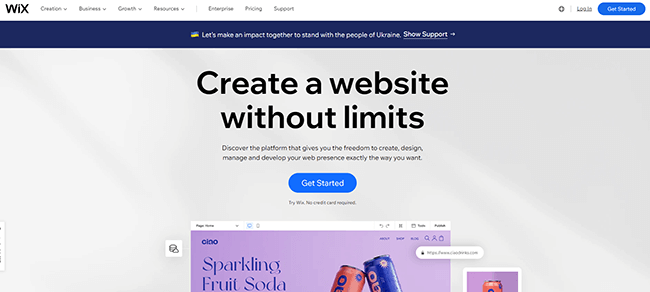
The site builder tool is extremely intuitive, and Wix offers tons of templates that are perfect for ecommerce stores. You can build a functional and professional-looking website in just a few clicks—no coding skills required.
When it comes to ecommerce, Wix is equally intuitive. You can use it to manage every aspect of your business venture from ecommerce sales to social media and in-person sales.
You can also use the unified dashboard to manage shipping, payments, and more. Wix’s ecommerce platform is fast, scalable, secure, and very easy to use, making it the perfect choice for people that are new to the world of online sales.
Key features
- Intuitive site builder
- Tons of ecommerce store templates
- All-in-one ecommerce platform
- Inventory and payment management
- Shipping management
Pros and cons
| Pros | Cons |
| Very easy to use | More expensive than some other options on the list |
| All-in-one solution (No extra tools required) |
Pricing
Plans start from as little as $16/month. Business and ecommerce plans start from $27/month.
Final thoughts
That concludes our roundup of the best Big Cartel alternatives.
The right choice for your business will depend on what features you’re looking for, how much control and flexibility you need, and your budget—but you can’t go wrong with any of our top three picks:
- Sellfy is the best Big Cartel alternatives for creative entrepreneurs like artists and makers. It’s very beginner-friendly and comes with everything you need to start selling out of the box, including print-on-demand fulfillment (and zero transaction fees).
- Payhip is another solid choice for selling digital products. It’s very easy to use and stands out for its simplicity. And its free plan includes unlimited products and revenue, as well as all features.
- Shopify is the best choice if you want to build a full-fledged ecommerce store. It’s well-suited to larger businesses and offers more flexibility and scalability. But you’ll be subject to additional transaction fees unless you use Shopify Payments.
Want to explore even more options? Check out our roundup of the best platforms to sell digital products. Or if you want to sell memberships, try these subscription ecommerce platforms.
Disclosure: If you buy through links on our site, we may make a commission. This helps to support the running of Startup Bonsai.
